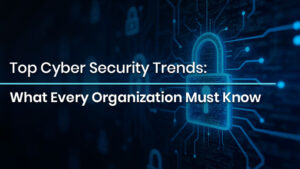
Top Cyber Security Trends: What Every Organization Must Know
Top Cyber Security Trends: What Every Organization Must Know Introduction In an era marked by digital transformation, remote workforces, and rapidly evolving threat landscapes,
Limited-Time Offer! Get an exclusive 40% OFF on IPSpecialist Premium Monthly & Annual Plans. Use Promo Code: UPSKILLNOW at checkout.

Top Cyber Security Trends: What Every Organization Must Know Introduction In an era marked by digital transformation, remote workforces, and rapidly evolving threat landscapes,

Zero Trust vs. SASE: Everything You Need to Know Introduction As the cyber world continues to change, companies need to look beyond conventional security

Cloud Security Posture Management (CSPM) Introduction In the era of digital transformation, organizations are moving to the cloud at an unprecedented pace. While the
Table of Contents
Emerging technologies like the Internet of Things (IoT) continually disrupt organizations and industries. As organizations continue to use emerging technology to revolutionize their businesses.
The globe is getting more connected daily, and with more connectivity comes increased susceptibility. The Internet of Things (IoT) connects everyday items to the Internet, resulting in a web of interconnected devices that hackers can exploit. This article demonstrates how to secure IoT by combining it with Blockchain.
Traditional IT systems must prepare to handle the tremendous influx of data that the full IoT implementation represents. The amount, velocity, and variety of data generated by IoT networks threaten to overwhelm enterprise systems or significantly limit the capacity to make prompt decisions based on reliable data.
The current IoT deployment method Furthermore, the ability to include commercial terms simplifies the automation of transactions between IoT nodes and IoT partners. This may help reduce transmission lag, especially if the transactions do not necessitate using the cloud’s computer capabilities.
Artificial Intelligence and Machine Learning can assist organizations with answering the questions. They can also provide additional possibilities for an organization to incorporate IoT and blockchain technology. AI can assist in identifying the data that is genuinely required among the massive amounts of data produced by IoT networks.
IoT/blockchain ecosystems might filter through massive amounts of data using AI to determine what information is vital to analysis and commercial decision-making, where it should be stored, and what should be collected. Artificial intelligence can make blockchain more innovative and functional.
It is easy to conceive how blockchain could speed up, simplify, and secure IoT implementations. However, combining the two is still in its early stages.
One of the advantages of using blockchain in various applications, not just IoT, is that every transaction is recorded.
Furthermore, IoT on the blockchain will enable a far more streamlined procedure from the maker to the recipient and everything in between. This is much faster now that everyone can access all documents and a simple and secure way to sign them.
IoT allows Internet-connected devices to transfer data to private blockchain networks, which produce tamper-resistant records of shared transactions. IBM Blockchain enables your business partners to exchange and access IoT data with you while eliminating centralized control and management requirements. Each transaction can be validated to prevent conflicts and create trust among all network users with permission.
While blockchain and the Internet of Things are formidable technologies in their own right, merging the two might be tremendously helpful to organizations. This technique is referred to as BCoT (Blockchain of Things).
The IBM Blockchain technology is open, interoperable, and designed for your multicloud world, utilizing the most recent version of the industry.
In various ways, blockchain technology can be utilized to protect IoT networks. One approach would be developing a decentralized device authentication and communication system. Each IoT device may be linked to the blockchain network and given a unique digital identity that can be confirmed using digital signatures and smart contracts.
One of the essential qualities of blockchain is its ability to validate data and confirm that it comes from a reliable source. This is highly beneficial because of the large number of devices in the IoT.
Combining blockchain and IoT can reinforce privacy agreements while improving secure communications. Having a reliable ledger that shows who has access and who is transacting is a considerable advantage.
Many organizations are concerned about increasing the efficiency of their supply networks. However, this procedure is impeded by economic and global challenges. Blockchain and IoT can improve supply chain efficiency by eliminating intermediaries, increasing transaction speed, and lowering costs.
One of the most recognized benefits for firms is the ability to reduce operating expenses. Data is transmitted peer-to-peer, reducing the need for centralized management and saving the organization money.
Accounting would be one of the first departments within a company to gain from the greater transparency brought forth by blockchain and IoT.
Moving goods is a complicated procedure involving multiple stakeholders with varying priorities. As cargo containers move, an IoT-enabled blockchain can record their temperatures, position, arrival times, and status.
Tracking aircraft, automobiles, or other product components is crucial for safety and regulatory compliance. IoT data stored in shared blockchain ledgers allows all parties to track component origins throughout a product’s life. Sharing this information with regulatory bodies, shippers, and manufacturers is safe, simple, and inexpensive.
IoT devices monitor the status of essential machines and their maintenance. Blockchain delivers a tamper-proof database of operating data and the resulting maintenance for everything from engines to lifts. Third-party repair partners can monitor the blockchain for preventive maintenance and log their activity.
To summarize, blockchain technology is a game changer in data security and can revolutionize how we interact with our connected gadgets. As the world becomes more connected, blockchain technology will protect these linked devices from cyber-attacks.
Through its decentralized infrastructure, blockchain can improve IoT-based devices for smart homes by solving security issues and removing any intermediary.
Check Out Our Courses Today to Kickstart Your Career in Latest Technologies!
Explore Now© 2025 All rights reserved | Privacy Policy | Terms and Conditions | Sitemap | Cookie Policy




